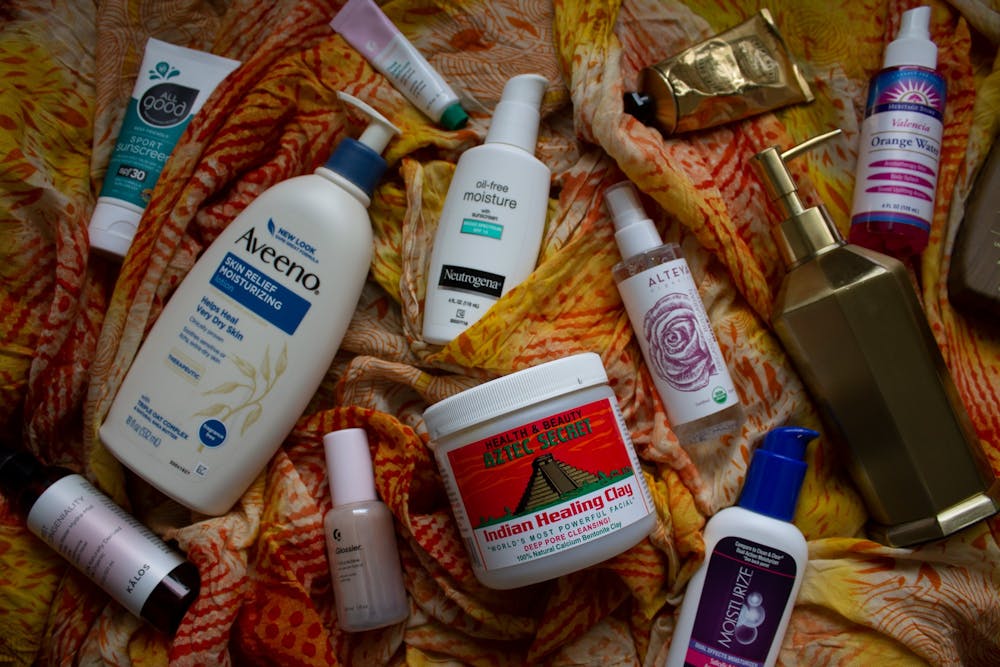Skincare routines vary from person to person. Whether it’s in the number of steps, which products are used or how many times a day the routine is completed, everyone has a different process and budget.
But the best skin care routines don't have to be elaborate or expensive.
Before college students jump into a new skin care routine, they should prioritize making easy, affordable lifestyle choices that will contribute to healthy skin, said Dr. Roxanne Rajaii, a dermatologist at the Dermatology Center of Southern Indiana. Rajaii said smoking and vaping are detrimental to skin, and tanning – particularly the use of tanning beds – can lead to accelerated skin aging and cancer. Drinking water, staying active and eating a healthy diet are vital.
Christy Brown, esthetician and owner of the Bloomington Skin Care & Acne Clinic, said excess amounts of certain foods and drinks can contribute to skin problems.
“I have had many clients ask me if coffee or beer causes acne,” Brown said. “I tell them not necessarily. However, those mocha lattes, frappuccinos, pitchers of beer and pizza are not helping matters.”
Dairy is often considered a cause of acne and skin problems, and, depending on how much you consume, it could cause issues.
“Dairy of all kinds can be problematic for people with acne if consumed in excess. Moderation is key,” Brown said.
In addition to making lifestyle choices that are best for your skin, Brown said committing to a skincare routine twice daily is recommended. Prioritizing a nighttime routine to wash off dirt and makeup that has built up over the course of the day is the most important part of a skin care routine.
“I can always tell those who don’t wash their faces before retiring at night,” Brown said. “Their skin has this constant low-level chronic inflammation. These people will notice more frequent eruptions and definitely oilier skin.”
Over-the-counter products are an easy go-to for skin care because they can be found in local grocery stores and are relatively inexpensive. However, students need to make sure they pick products that fit their needs best.
“The problem that arises for many consumers, and where they most often need assistance, is knowing which product is appropriate for their individual skin needs,” Brown said. “Brands spend a lot of time and money in an attempt to influence your purchasing habits. Everything from picking the right wording, packaging, colors, and smells.”
Rajaii said there are still many brands that have great over-the-counter products, such as Eucerin, Neutrogena, Aveeno, La Roche-Posay and Vanicream. Rajaii said Vanicream is particularly good for allergy-prone skin, and brands like Cerave and Cetaphil have a wide variety of products including cleansers, moisturizers and sunscreens for every skin type. Rajaii added that you should use all oil-free and non-comedogenic makeup products and mineral-based products are good for skin prone to acne.
Completing the right steps in addition to selecting the right products is also important when completing a skin care regimen, according to Rajaii. College students may need to adjust their skin care routine now that they’ve moved into adulthood and their skin is changing.
“Generally, for adults, it should include cleansing your face with a gentle cleanser twice daily, using a lightweight oil-free moisturizer with sunscreen every morning, and using a retinol plus vitamin C serum in the evenings,” Rajaii said.
Lastly, going to a dermatologist once a year is recommended for those who have family history of diseases such as melanoma or skin cancer. If you begin to notice moles or differences in their skin, you should schedule an appointment with a board-certified dermatologist.






